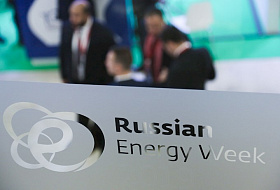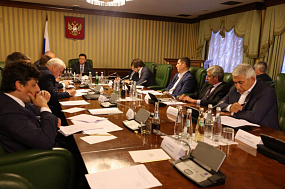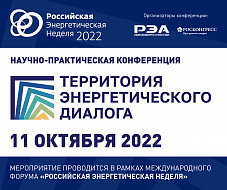RusHydro advocates for the active development of Russia's hydropower potential

RusHydro representatives are
participating in key industry sessions at Russian Energy Week, currently being
held in Moscow.
RusHydro Group, the flagship
of Russia's green power industry, is dedicated to ensuring the reliable power
supply and safe operation of power facilities while promoting sustainable power
generation with a focus on low-carbon development. This commitment was
discussed during the specialized session titled Advancing Hydropower: From
Plans to Implementation.
In the current conditions of a
changing world, the sustainable development of a country is impossible without
the development of low-carbon energy sources. As RusHydro has noted, hydropower
stands out as a key and long-term source of clean, renewable energy. Hydropower
plants are among the cleanest types of energy generation, as they do not
involve fuel combustion, resulting in no direct CO2 emissions during power
generation and no dependence on fuel supplies. Russia ranks second in the world
in terms of available hydropower resources, of which only 22% are currently
utilized. Therefore, Russia possesses significant untapped hydroelectric
potential, which represents a critical strategic resource for the country's
economic and regional growth.
At the same time, RusHydro
considers it appropriate to discuss accelerated infrastructure development,
known as the 'supply economy'. This concept was mentioned in a recent speech by
Russian President Vladimir Putin at the St. Petersburg International Economic
Forum. It is crucial to accelerate the development of hydropower to ensure
effective long-term planning for the energy sector and the country's economy as
a whole.
In order to prevent the energy
sector from becoming a constraining factor in a region's development, and to
ensure that the choice of a generation source is made in advance, taking into
account all the specifics and complex effects, it is necessary to transition to
a long-term forecast of electricity demand and capacity, considering the
possibilities of industrial development. It is of utmost importance to
establish a system of interaction with regulators, consumers, and investors in
energy-intensive projects with long-term investment plans (over 10 years).
The construction of hydropower
plants is also relevant to the Far East, particularly in the context of
implementing the President's directive for the development of energy capacity
in the Far Eastern Federal District by 2050. Hydropower development also aligns
with the Low Carbon Development Strategy of the Russian Federation. To achieve
the objectives outlined in this document, including maintaining a hydropower
share of at least 20% in the Unified Energy System of Russia until 2050, it is
essential to commission new hydropower plants.
RusHydro emphasizes that
hydroelectric power plants not only meet consumer demand for electricity but
also provide protection against floods. In the spring of this year, RusHydro
began designing top-priority flood control hydroelectric power plants in the
Amur Region: Nizhne-Zeyskaya HPP (400 MW) and Selemdzhinskaya HPP (100 MW). The
key task of the new hydropower plants will be to combat destructive floods in
the Amur basin by delaying flood flows in reservoirs. Over the past 10 years,
the region has experienced five severe floods, with hundreds of settlements and
economic facilities in the Amur Region, the Jewish Autonomous Region, and the
Khabarovsk and Primorsky Territories exceeding the danger level. The
construction of Nizhne-Zeyskaya and Selemdzhinskaya HPPs for flood control will
enable the control of up to 85% of the Zeya River's flow.
According to the designers'
calculations, the new power plants will offer flood protection to as many as
one million people. In the southern and southeastern parts of the Amur Region,
the Jewish Autonomous Region, and Khabarovsk Territory, tens of thousands of
hectares of arable land will be safeguarded from the adverse effects of
flooding.
The construction of the Nizhne-Zeyskaya and
Selemdzhinskaya HPPs will have complex socio-economic effects on the
development of territories and related industries. The construction of HPPs
will increase the number of jobs: the total number of people employed in the
construction of HPPs during the "peak" years will be 8,000 to 10,000
people. According to preliminary calculations, the economic and flood control
effects are 3 to 4 times greater than the investment costs of the projects.
Additionally, HPP reservoirs create a strategic freshwater reserve and add
value to other industries (up to 10% of the total investments in HPP
construction). HPP reservoirs also contribute to a direct reduction in the
region's carbon footprint by 78,000 tonnes of CO2-equivalents annually due to
the difference between the absorption and emission of greenhouse gases by HPP
reservoirs.
The Russian Energy Week
International Forum is a key global platform for discussing current trends in
the development of the modern fuel and energy sector. This event is
traditionally held at the highest level, featuring the participation of leaders
from the largest companies in the energy industry. In 2022, more than 70
events, with the involvement of over 270 speakers, were held as part of REW.
The Forum attracted over 3,000 participants and media representatives from
Russia, as well as 83 foreign countries and territories. The Forum is organized
by the Roscongress Foundation and the Ministry of Energy of the Russian
Federation, with the support of the Moscow City Government.
Official website of REW: rusenergyweek.com. For news about the event and the industry, please
follow the official REW page on VK.





